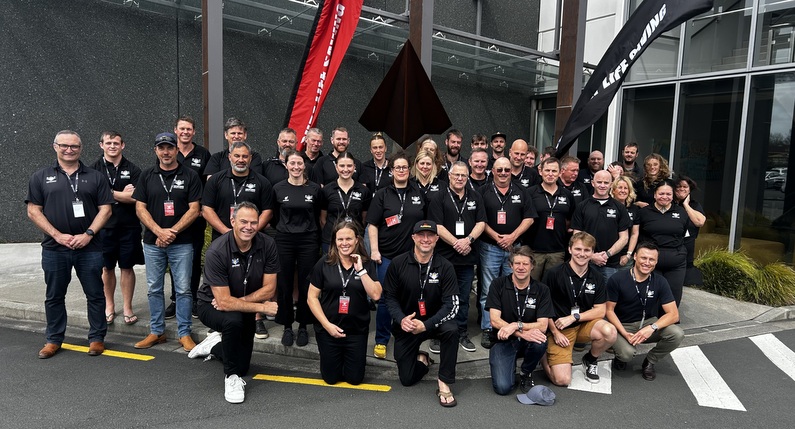
Surf Life Saving NZ's new National SAR Framework
Surf Life Saving New Zealand (SLSNZ) has taken a major step forward in strengthening its national Search and Rescue (SAR) capability, with the release of its new SAR Framework at the organisation’s inaugural SAR Leaders Forum in September.
The Framework – endorsed by the SLSNZ Board in August – sets a clear national direction for how SLSNZ delivers SAR across Aotearoa. Acting as a compass, not a manual, it provides shared language, consistency, and alignment across the organisation’s 43 SAR Squads while ensuring flexibility for local execution.
“This is where it gets real,” said Matt Cairns, SLSNZ National SAR & Paid Lifeguard Service Manager. “We are now moving from design into delivery. What better way to do that than by working directly with the Squad Leaders who lead our SAR capability on the ground, alongside our coordinating authorities – NZ Police and the Rescue Coordination Centre New Zealand (RCCNZ) – in a full weekend of workshops.”
Inspector Simon Kernahan, NZ Police Senior Manager: Command & Emergency Management, welcomed the Framework’s release: “Surf Life Saving plays a vital role in supporting New Zealand’s search and rescue system. This Framework strengthens the connection between Police as a coordinating authority and the volunteers we rely on at the frontline. It gives us confidence that when we call on Surf Life Saving, we’re engaging with a capability that is nationally consistent, safe, and well supported.”
Justin Allan, General Manager of RCCNZ, echoed this view: “The SAR Framework helps ensure Surf Life Saving’s squads can integrate seamlessly into complex, multi-agency operations. Whether it’s a coastal search or an offshore response, clarity around roles and standards makes our collective system stronger, safer, and more resilient.”
Volunteer leaders also embraced the new approach. Daniel Harvey, Squad Leader of Bethells Beach Surf Life Saving Patrol, said: “I thoroughly enjoyed the opportunity to meet leaders from SAR squads around the country, as well as the new SAR Support Officers and members of the SLSNZ SAR Committee. Having all the SAR leaders in one room to workshop the new Framework will provide invaluable feedback as it is implemented. Each squad has unique local needs, but national alignment and support strengthens our ability to upskill, develop, and show funders and tasking agencies our capacity and capability. A real highlight was hearing from our colleagues in Tasmania about their centre of excellence for swift and floodwater rescue – insights that will be highly relevant for many squads in future as the Framework helps standardise training and accreditation.”
Jess Bennett, Squad Leader of the Hawke’s Bay Area Squad, agreed: “The Forum gave us the chance to shape how this Framework will work in practice. Having led our squad through the response to Cyclone Gabrielle, I know how important it is that national plans reflect the realities faced by volunteers on the ground. The open discussions between volunteer leaders and staff over the weekend were a great step forward. I’ll continue to support the Severe Weather workstream and share learnings from our experience to help ensure the plans we put in place are practical and effective.”
These perspectives highlight how lived experience will continue to guide national implementation of the Framework.
To bring the Framework to life, volunteer leaders and staff discussed the priority workstreams for the first year of Framework delivery.
These include:
- Operations Guide – refining roles, activation levels, and communication systems
- Accreditation & Capability – introducing minimum standards and requirements for accreditation in specific SAR capabilities, beyond the scope of lifeguard training
- Education & Training – aligning training modules with accreditation pathways
- Squad Support – focusing on admin support, squad wellbeing, cultural inclusion, and volunteer recognition
- Asset Management – standardising PPE, equipment, and technology systems
- Severe Weather Role – clarifying SLSNZ’s part in flood and extreme weather response
- Squad Partnerships & Finance – strengthening partnerships and financial sustainability
“These workstreams are where the real mahi begins,” said Cairns. “Over the next three years we’ll embed the Framework into every part of our SAR system – from training and accreditation to equipment, wellbeing, and partnerships. National support will back local execution, ensuring our volunteers can continue to deliver safe, trusted, and timely SAR response for communities across Aotearoa.”
The full SAR Framework is available for download here: surflifesaving.org.nz/lifesaving/search-rescue
Original story provided by Surf Life Saving New Zealand
